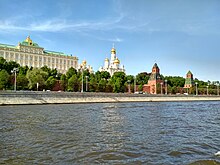

This article needs additional citations for verification. Please help improve this articlebyadding citations to reliable sources. Unsourced material may be challenged and removed.
Find sources: "Moskva" river – news · newspapers · books · scholar · JSTOR (December 2009) (Learn how and when to remove this message) |
| Moskva | |
|---|---|

The Moskva at the Kremlin in Moscow
| |

Map of the Volga watershed with the Moskva highlighted; the two rivers are directly connected by the Moscow Canal
| |
| Native name | Москва (Russian) |
| Location | |
| Country | Russia |
| Region | Podmoskovye |
| Physical characteristics | |
| Source | Moskva |
| • location | Sychiki, Podmoskovye |
| • coordinates | 55°30′50″N 35°21′50″E / 55.514°N 35.364°E / 55.514; 35.364 |
| • elevation | 246 m (807 ft) |
| Mouth | Oka |
• location | Kolomna, Podmoskovye |
• coordinates | 55°04′31″N 38°50′43″E / 55.0753°N 38.8453°E / 55.0753; 38.8453 |
• elevation | 98 m (322 ft) |
| Length | 473 km (294 mi) |
| Basin size | 17,600 km2 (6,800 sq mi) |
| Basin features | |
| Progression | Oka→ Volga→ Caspian Sea |
The Moskva[1] (Russian: река Москва, Москва-река, Moskva-reka) is a river that flows through western Russia. It rises about 140 km (90 mi) west of Moscow and flows roughly east through the Smolensk and Moscow Oblasts, passing through central Moscow. About 110 km (70 mi) southeast of Moscow, at the city of Kolomna, it flows into the Oka, itself a tributary of the Volga, which ultimately flows into the Caspian Sea.
According to recent studies, the current riverbed of the Moscow River was occupied about 12 thousand years ago[2]
In addition to Finnic tribes, the Moskva River is also the origin of Slavic tribes such as the Vyatichi tribe.[3]

The name of the city is thought to be derived from the name of the river.[4][5] Several theories of the origin of the name have been proposed.
The most linguistically well-grounded and widely accepted is from the Proto-Balto-Slavic root *mŭzg-/muzg- from the Proto-Indo-European *meu- "wet",[5][6][7] so the name Moskva might signify a river at a wetland or a marsh.[4] Its cognates include Russian: музга, muzga "pool, puddle", Lithuanian: mazgoti and Latvian: mazgāt "to wash", Sanskrit: májjati "to drown", Latin: mergō "to dip, immerse".[4][6] In many Slavic countries Moskov is a surname, most common in Russia, Bulgaria, Ukraine and North Macedonia.[8] Additionally, there are similarly named places in Poland like Mozgawa.[4][5][6]
According to one the Finno-Ugric hypotheses, the Merya and Muroma people, who were among the several pre-Slavic tribes which originally inhabited the area, called the river Mustajoki "Black river", and the name of the river derives from this term.[9] Various other theories (ofCeltic, Iranian, Caucasic origins), having little or no scientific ground, are now largely rejected by contemporary linguists.[4][5]
To distinguish the river and the city, Russians usually call the river Moskva-reka (Moskva river) instead of just Moskva.


The river is 473 km (294 mi) long (or 502 km (312 mi)),[10] and the area of its drainage basin is 17,600 km2 (6,800 sq mi).[11] It has a vertical drop of 155 m (509 ft) (long-term average). The maximum depth is 3 metres (9.8 ft) above Moscow city limits, and up to 6 metres (20 ft) below it.[12] Normally, it freezes in November–December and begins to thaw around late March. During an unusually warm winter in 2006–2007, ice began melting on January 25. The portion of the river running through Moscow only freezes occasionally on account of contamination.[13]
The absolute water level in downtown Moscow is 120 metres (390 ft) above sea level (long-term average of summer lows after World War II); a historical maximum of 127.25 metres (417.5 ft) above sea level was set by the 1908 flood.[14]
The main tributaries of the Moskva are, from source to mouth:[11]
Sources of water are estimated as 61% thaw, 12% rain and 27% subterranean. Since completion of the Moscow Canal (1932–1937), the Moskva River has also collected a share of Upper Volga water. This has enabled reliable commercial shipping, which was previously interrupted by summer droughts (older dams built in 1785, 1836 and 1878 were not effective). The average discharge, including Volga waters, varies from 38 m3/s (1,300 cu ft/s) near Zvenigorod to 250 m3/s (8,800 cu ft/s) at the Oka inlet. The speed of the current, depending on the season, varies from 0.1 m/s (0.33 ft/s) (winter, dams closed) to 1.5–2.0 m/s (4.9–6.6 ft/s) (May, dams open).

Moscow (Москва́), the capital of Russia, is situated on its banks. The river also flows through the towns of Mozhaysk, Zvenigorod, Zhukovsky, Bronnitsy, Voskresensk, and — at the confluence of the Moskva and Oka — Kolomna. As of 2007, there are 49 bridges across the Moskva River and its canals within Moscow city limits; the first stone bridge, Bolshoy Kamenny Bridge, was erected in 1692. Within the city, the river is 120–200 metres (390–660 ft) wide, the narrowest point being under the Kremlin walls. Drinking water for the city of Moscow is collected from five stations on the Moskva River and from the Upper Volga reservoirs (north and north-west of the city).
Canals, built within Moscow city limits, have created a number of islands. Some of them have names in Russian, some have none. Major, permanent islands (west to east) are:
One of the most famous is an unnamed artificial island in the center of the city between the river proper and the Bypass Canal[15]


There is a fleet of river ice-breaker cruisers which ply routes from moorings at the Hotel Ukraine and Gorky Park to the Novospassky Monastery and back. Duration of trips ranges from 1.5 to 3 hours.[16]
{{cite book}}: CS1 maint: multiple names: authors list (link)
"Moskva" . Encyclopedia Americana. 1920.
| International |
|
|---|---|
| National |
|